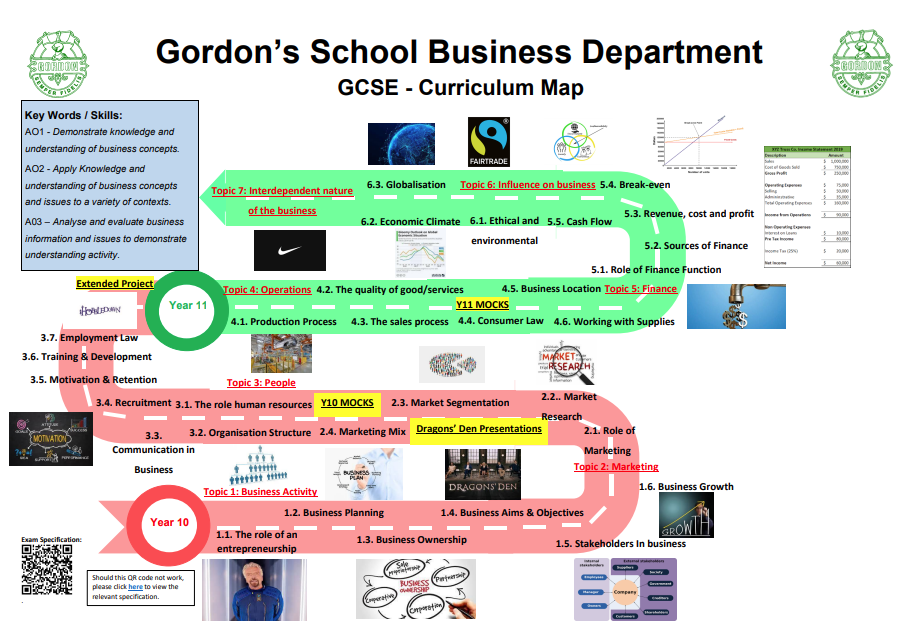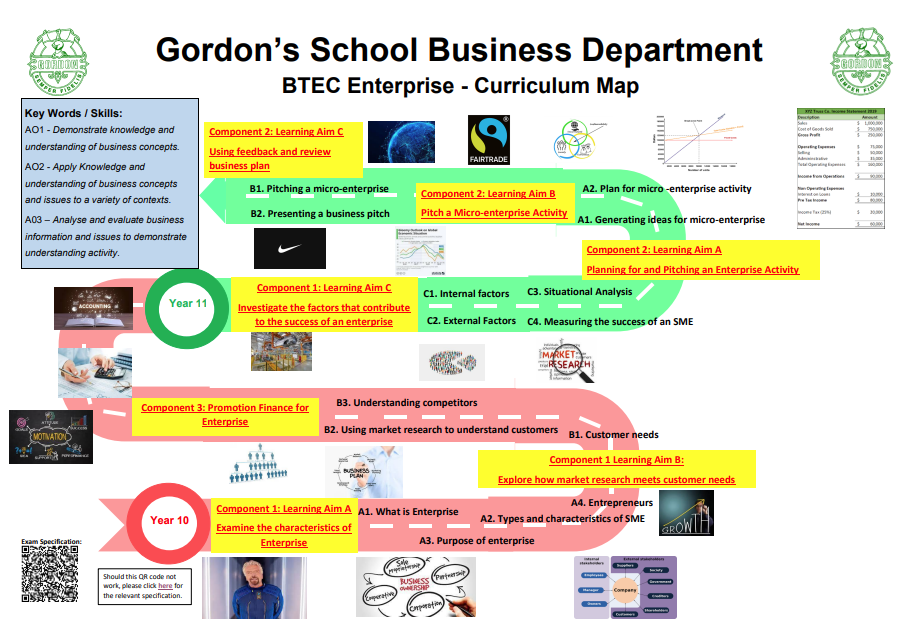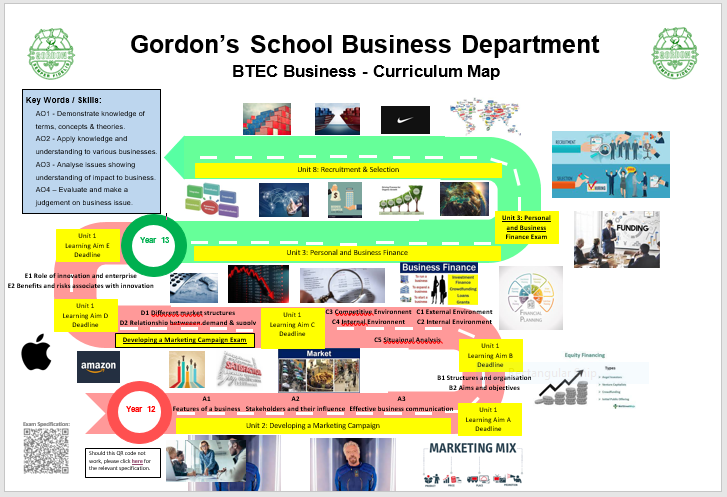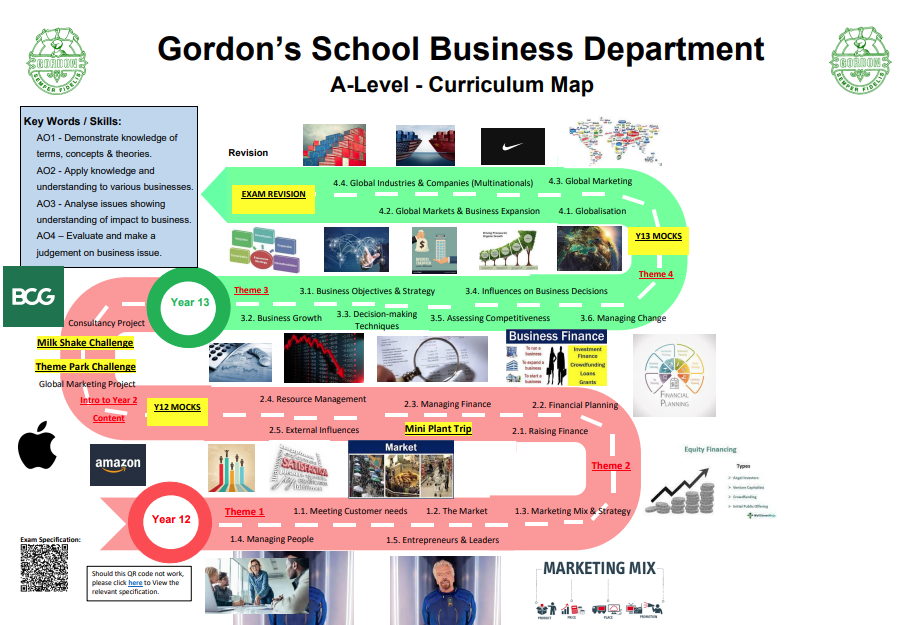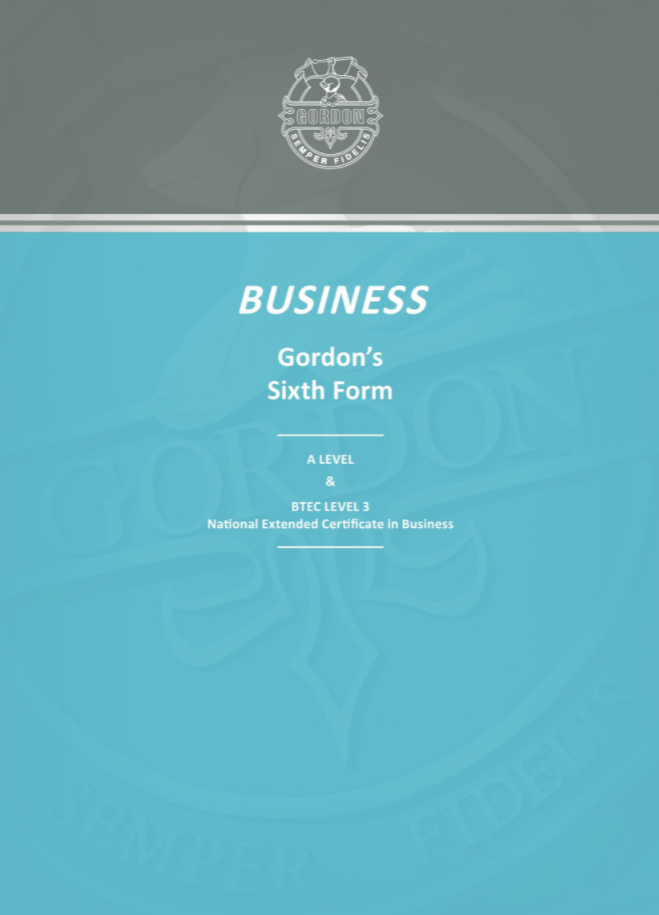Business Studies
Summary
Business Studies is not taught in Years 7-9. However, the department has participated successfully for many years in the Prince’s Trust Enterprise Challenge competition where Year 9 students compete in an online business simulation game that replicates the real world and are taught about ethical business and sustainability issues, whilst working together to devise a suitable business idea that will benefit the local community. Other past enterprise activities offered for lower school students, include the Scholastic Book Fair (Year 7), Arete Inter-School Business Challenge (Year 8) and Dragons’ Den challenge for enrichment week (Year 9).
gcse business Summary
GCSE Business (OCR Syllabus) encourages students to develop a genuine interest in how businesses achieve success, providing them with realistic learning experiences which they will carry on into later life. The syllabus explores what is important for a successful business, from the people that work within it and the product that is produced, to the way a product is launched in a market and the finance behind the profit. To maximise student engagement the department runs several high profile activities, including hosting a Dragons’ Den Event, where GCSE students demonstrate their business acumen by developing and pitching a business idea to a panel of local entrepreneurs. During the course, students will also have the opportunity to visit local businesses and observe entrepreneurship in practice, including participating in the Young Enterprise Company Programme.
Course details
Year 10 - At the beginning of this course, students are introduced to key concepts and issues concerning the activities of a business. They explore the purpose and role of a business from providing good and services to meet customer needs, through to the growth of an established business. Students will learn what makes a successful entrepreneur, how to identify and develop a business idea and spot opportunities that might one day make money, through participation in activities such as Dragons’ Den. They also look at the role of marketing and human resources.
Year 11 - Students take a closer look at the role of operations and finance in business activity. Operations include production processes, quality of goods and services, customer service, and working with suppliers. Finance covers its role, its sources, costs, profit and loss, cash and cash flow. They also explore how business responds to external influences, such as ethical and environmental considerations, the economic climate and globalisation, and the interdependent nature of business.
TYPICAL ACTIVITIES
Case studies, mini projects, multiple choice questions, decision-making, essays.
BTEC VOCATIONAL COURSES
COURSE DETAILS
The department currently offers the following vocational courses for Key Stage 4 students – Pearson BTEC Level 1/Level 2 First Award in Business and Pearson BTEC Level 1/Level 2 First Award in Travel and Tourism, both of which provide opportunities for learners to develop a range of business skills, personal qualities and attitudes essential for successful performance in working life. Each BTEC qualification is equivalent to one GCSE and are for those students who are self-motivated, able to remain focused on an extended piece of writing and are able to work independently. They provide a longer period of time to complete tasks compared to the examination environment, with a greater focus on coursework rather than exams, but they are no less challenging academically than GCSE. After successful completion of a BTEC course, students will be able to choose whether to continue in further education by studying A-Levels or vocational subjects in the Sixth Form or by following other progression routes into employment.
Pearson BTEC Level 1/Level 2 Tech Award in Enterprise
This exciting qualification is for students who wish to study the knowledge, behaviours and skills related to researching, setting up, running and reviewing a business, but in a more practical and vocational context compared to GCSE Business. Students will explore a variety of different types of business organisation, from the large multi-national companies such as Amazon, to the characteristics of small and medium enterprises (SMEs) and entrepreneurs, with reasons for their levels of success. Using this research, students will then set up their own small enterprise and take responsibility for devising a business idea and putting this into practice. Students will also learn how a business manages its money and people, and how it markets products that people want to buy.
Pearson BTEC Level 1/Level 2 First Award in Travel and Tourism
During this course students will gain a broad knowledge and understanding of, and develop skills in, the travel and tourism sector. Students will learn the main types of tourism in the UK and on an international scale. Students will understand what the different destinations have to offer different types of visitors and how the UK travel and tourism industry has developed with changing lifestyles, interests and technology. This course will inspire students to consider working in the dynamic travel and tourism sector. Such a career is not only personally rewarding, with a chance to travel the world, but could be financially rewarding too.
TYPICAL ACTIVITIES
Investigations, case studies, coursework and presentations are a core element of the course.
A LEVEL BUSINESS
A Level Business (Edexcel Syllabus) is designed to allow students to understand how and why business decisions are made, as well as discuss their effects on different functional areas of a business. This course requires an inquisitive mind and a genuine interest in how businesses achieve success, as well as a real interest in the environment in which businesses operate, for example, how interest rates can affect a business’s success and why technology can help a business beat its competition. Students will be studying a subject that is dynamic and ever-changing, therefore they will acquire a range of important skills including critical analysis, research and communication skills, all of which are highly transferable to a range of different industries and future careers. There are business trips to Cadbury’s World and the Mini Factory in Oxford, and the department makes regular use of guest speakers and local entrepreneurs, in order to enhance the curriculum.
Course details
Year 12 - For a business to operate effectively, tasks must be carried out by different functional areas or departments such as marketing, people, finance and operations. Theme 1 enables students to understand how businesses identify opportunities and how they can develop and promote their competitive advantages in order to build customer loyalty. This theme also considers people, exploring how businesses recruit, train, organise and motivate employees, as well as the role of enterprising individuals and leader. In Theme 2, students develop an understanding of raising and managing finance, and measuring business performance. The theme outlines the importance of using resources efficiently within a business to ensure that goods or services can be delivered effectively and efficiently, and to a high quality. Students also consider the external influences that have an impact on businesses, including economic and legal factors.
Year 13 - In the second year of this A Level course, students will explore influences on business strategy and decision-making (Theme 3), as well as explore business activity in a global context (Theme 4). Students learn about larger businesses and the challenges they face on both a day-to-day basis and in planning for the future, including the ethical and moral dimensions of global business activities.
Entry Criteria
A Level - GCSE grade 6 in Business or Distinction in BTEC Enterprise (Business). if not studied grade 5 in English language and maths.
BTEC LEVEL 3 BUSINESS
The BTEC Level 3 National Extended Certificate in Business (equivalent in size to one A Level) is assessed through a combination of coursework and external assessment methods, including an exam. It is designed for students who are interested in learning about the business sector alongside other fields of study, with a view to progressing to a wide range of higher education courses, including university and apprenticeships, as well as help prepare them for future employment. Practical skills and theoretical understanding are at the heart of understanding the world of business and students will study the purposes of different businesses, their structure, the effect of the external environment, and how they need to be dynamic and innovative to survive.
Entry Criteria
BTEC - GCSE grade 4 in English and Mathematics are required. Where Business Enterprise Level 2 is studied, a Merit is required

